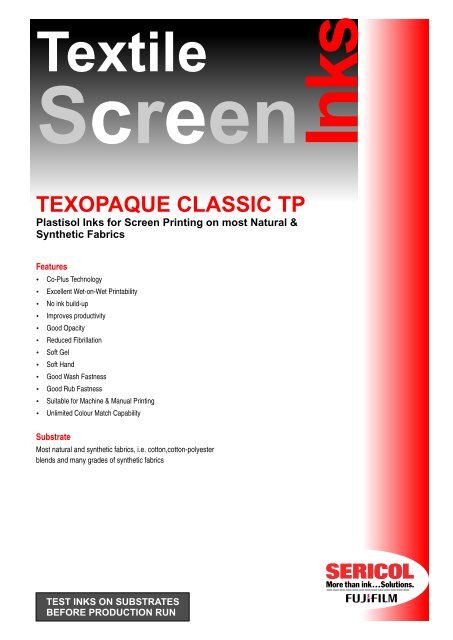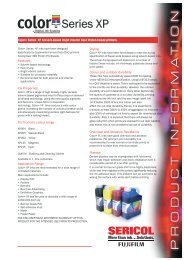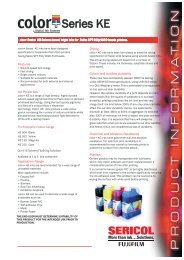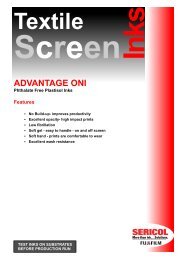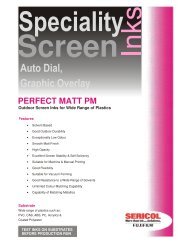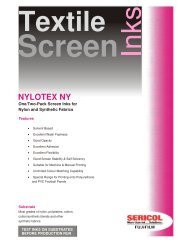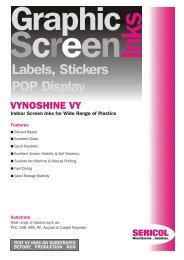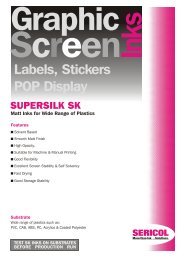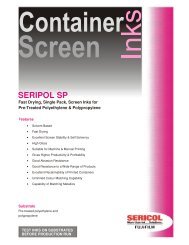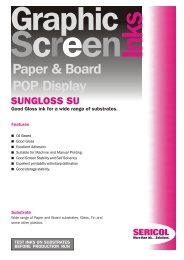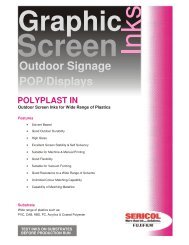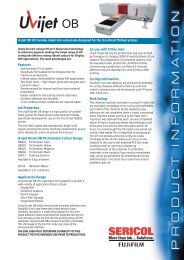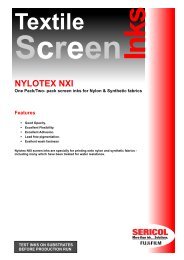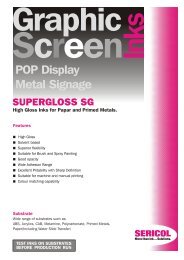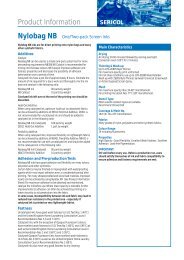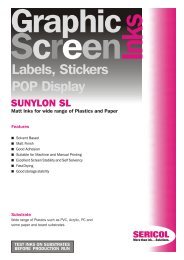Texopaque TP.cdr - Fujifilm Sericol India
Texopaque TP.cdr - Fujifilm Sericol India
Texopaque TP.cdr - Fujifilm Sericol India
You also want an ePaper? Increase the reach of your titles
YUMPU automatically turns print PDFs into web optimized ePapers that Google loves.
Textile<br />
Screen<br />
Inks<br />
TEXOPAQUE CLASSIC <strong>TP</strong><br />
Plastisol Inks for Screen Printing on most Natural &<br />
Synthetic Fabrics<br />
Features<br />
Co-Plus Technology<br />
Excellent Wet-on-Wet Printability<br />
No ink build-up<br />
Improves productivity<br />
Good Opacity<br />
Reduced Fibrillation<br />
Soft Gel<br />
Soft Hand<br />
Good Wash Fastness<br />
Good Rub Fastness<br />
Suitable for Machine & Manual Printing<br />
Unlimited Colour Match Capability<br />
Substrate<br />
Most natural and synthetic fabrics, i.e. cotton,cotton-polyester<br />
blends and many grades of synthetic fabrics<br />
TEST INKS ON SUBSTRATES<br />
BEFORE PRODUCTION RUN<br />
_____________
_____________<br />
Thinning<br />
Plastisol Flow Thinner, SS-591, can be used up to a maximum of 5%<br />
Mesh<br />
Monofilament, polyester fabric ranging from 34 thread / cm to 120<br />
thread / cm can be used. For fine details printing, use amber or<br />
yellow coloured fabric with a higher thread count of 90 to 120 per cm.<br />
Stencils<br />
Stencils can be best prepared with <strong>Sericol</strong>'s stencil making products:<br />
Xtend Prep 101 for abrasion of screen<br />
Xtend Prep 102 for degreasing of screen<br />
Emulsions: Dirasol 125 (single pack), Dirasol 25<br />
(two pack) or Dirasol SuperTex<br />
Curing<br />
In case of direct printing on fabrics, <strong>Texopaque</strong> Classic <strong>TP</strong> inks<br />
must be heat cured at a minimum of 140 deg.C, preferably in an<br />
infra-red dryer with air circulation and heat exhaust systems, to<br />
achieve full wash fastness. Differences in film weight, drying<br />
equipment and fabric will greatly affect the dwell time required in<br />
the dryer to achieve through cure; typical dwell time is 1.5 to 3<br />
minutes. Dark colours will cure faster than light colours. It is<br />
important that the entire thickness of the ink film has the time to<br />
reach the cure temperature, else fastness properties will not be<br />
achieved. Evaluate the cure schedule by testing the print at the<br />
wash schedule it will ultimately be expected to pass. Flash Curing:<br />
Many factors affect the dwell time required for flash curing. These<br />
include the type and wavelength of the equipment used, and the<br />
distance between the curing unit and the print. Additional factors<br />
such as fabric and ink colour, film weight and coverage are also<br />
crucial. Under optimum conditions, dwell times of less than three<br />
seconds can be readily achieved.<br />
Coverage<br />
<strong>Texopaque</strong> Classic <strong>TP</strong> inks would give a coverage of 15 to 27<br />
sq.m. per kg when printed through a #43 thread per cm<br />
monofilament mesh.<br />
Wash Up<br />
Wash up screens with SS-639 Universal Screen Wash. This will<br />
ensure long life of stencils made with Dirasol emulsions.<br />
Wash Fastness<br />
<strong>Texopaque</strong> Classic <strong>TP</strong> prints have good wash fastness It should be<br />
noted that the combination of high wash temperatures and strong<br />
detergents can cause colour changes in some colour matches.<br />
This is particularly true when very small additions of a base colour<br />
are added. For example, pastel shades can change colour as the<br />
trace additions of base colours are affected in harsh wash cycles.<br />
For this reason, it is essential that all formulations are proofed prior<br />
to production to ensure wash fastness properties are acceptable.<br />
Fibrillation<br />
Fibrillation occurs when fibres from the garment break through the<br />
ink film during a wash cycle to give a faded appearance. While<br />
fibrillation has the look of poor wash fastness it is not caused by<br />
loss of ink, it occurs even with fully cured prints. There are several<br />
methods to minimize fibrillation. However, this would result in<br />
increased print handle:<br />
· Increase ink film weight<br />
· Use a flash-cure ground coat<br />
· Add 5% EZ444 Nylon Catalyst<br />
As demand for low handle / low film weight print increases, so<br />
does the likelihood of fibrillation. The complex relationship of ink,<br />
print technique and garment, reinforces the need to wash test<br />
prints to customer requirements prior to production.<br />
Pre-Production Test<br />
End-user must determine suitability of this product for the intended<br />
use prior to production.<br />
Always test for opacity, curing, rub fastness, wash fastness and<br />
other relevant properties before each production run.<br />
Storage<br />
Keep inks in a cool place, away from direct sunlight.<br />
Keep the ink can tightly closed when not in use.<br />
Left over inks should not be returned to the ink can.<br />
Shelf life is two to three years from the date of manufacture.<br />
Stir well before use.<br />
Applications<br />
<strong>Texopaque</strong> Classic plastisol inks can be used for direct printing,<br />
and also transfer printing, on T-shirts, sweat shirts, sports and<br />
fashion wear,<br />
badges, hats & caps, travel bags, footwear and other textile<br />
applications.<br />
Transfer Printing<br />
<strong>Texopaque</strong> Classic <strong>TP</strong> inks can also be used for production of ironon<br />
transfers.<br />
For production of multi-colour transfers, each colour should be heat<br />
set on a transfer paper. Heat setting is done at 100 deg.C for 30 to<br />
60 seconds. It is important that transfers are not over-set, as the<br />
adhesion of the transfers to the garment may be impaired. The<br />
finished transfer may be applied in a heat transfer machine at<br />
approximately 180 deg.C to 190 deg.C for 10 to 15 seconds. Care<br />
must be exercised with heat sensitive fabrics. The transfer paper<br />
should be allowed to cool down before removal.<br />
Caution: Prints, direct or transfer, may be ironed from the back of<br />
the fabrics at a cool setting, with a cloth over the printed area.<br />
Prints will not resist dry-cleaning and garments should be marked<br />
to this effect.<br />
Colour Range<br />
The <strong>Texopaque</strong> Classic <strong>TP</strong> Ink System includes Seritone & line colours,<br />
trichromatic (process) colours, phosphorescent & fluorescence colours,<br />
expanding base, expanding white and flash cure whites.
_____________<br />
SERITONE & LINE COLOURS<br />
<strong>TP</strong>-001 <strong>Texopaque</strong> Classic <strong>TP</strong> Black (P)<br />
<strong>TP</strong>-021 <strong>Texopaque</strong> Classic <strong>TP</strong> White (P)<br />
<strong>TP</strong>-025 <strong>Texopaque</strong> Classic <strong>TP</strong> Super Opaque White<br />
<strong>TP</strong>-042 <strong>Texopaque</strong> Classic <strong>TP</strong> Light Chrome Yellow (P)<br />
<strong>TP</strong>-043 <strong>Texopaque</strong> Classic <strong>TP</strong> Mid Chrome Yellow (P)<br />
<strong>TP</strong>-101 <strong>Texopaque</strong> Classic <strong>TP</strong> Light Orange<br />
<strong>TP</strong>-124 <strong>Texopaque</strong> Classic <strong>TP</strong> Deep Red (P)<br />
<strong>TP</strong>-134 <strong>Texopaque</strong> Classic <strong>TP</strong> Red (P)<br />
<strong>TP</strong>-162 <strong>Texopaque</strong> Classic <strong>TP</strong> Light Red (P)<br />
<strong>TP</strong>-165 <strong>Texopaque</strong> Classic <strong>TP</strong> Magenta (P)<br />
<strong>TP</strong>-166 <strong>Texopaque</strong> Classic <strong>TP</strong> Violet (P)<br />
<strong>TP</strong>-203 <strong>Texopaque</strong> Classic <strong>TP</strong> Mid Blue (P)<br />
<strong>TP</strong>-206 <strong>Texopaque</strong> Classic <strong>TP</strong> Deep Blue (P)<br />
<strong>TP</strong>-207 <strong>Texopaque</strong> Classic <strong>TP</strong> Navy Blue<br />
<strong>TP</strong>-285 <strong>Texopaque</strong> Classic <strong>TP</strong> Deep Green (P)<br />
<strong>TP</strong>-381 <strong>Texopaque</strong> Classic <strong>TP</strong> Extender Base<br />
Transfer Papers<br />
The selection of transfer papers for use with <strong>Texopaque</strong> <strong>TP</strong> is a<br />
critical element in optimising results. The following is a list of the<br />
standard papers available and their recommended use.<br />
TRB08 : T 75 Transfer Paper (CP)-75 GSM. Siliconised paper for<br />
use in the production of cold peel and litho printed transfers.<br />
TRC11 Soft Trans Paper (HS)-For use with hot spilt plastisol inks.<br />
Soft-trans is not release coated, but has a special sizing<br />
incorporated during manufacture to provide holdout for the ink.<br />
This allows for a consistent, even split of the ink film when peeled<br />
hot TRQ97 Glicote Transfer paper (CP)-To generate high gloss<br />
transfer prints<br />
Trichromatic Colours<br />
<strong>TP</strong>-004 <strong>Texopaque</strong> Classic <strong>TP</strong> Trichromatic Black<br />
<strong>TP</strong>-052 <strong>Texopaque</strong> Classic <strong>TP</strong> Trichromatic Yellow<br />
<strong>TP</strong>-135 <strong>Texopaque</strong> Classic <strong>TP</strong> Trichromatic Magenta<br />
<strong>TP</strong>-215 <strong>Texopaque</strong> Classic <strong>TP</strong> Trichromatic Cyan<br />
Phosphorescent Colour<br />
<strong>TP</strong>-327 <strong>Texopaque</strong> Classic <strong>TP</strong> Phosphorescent Green<br />
Fluorescent Colours<br />
<strong>TP</strong>-077 <strong>Texopaque</strong> Classic <strong>TP</strong> Fluorescent Yellow<br />
<strong>TP</strong>-119 <strong>Texopaque</strong> Classic <strong>TP</strong> Fluorescent Orange<br />
<strong>TP</strong>-179 <strong>Texopaque</strong> Classic <strong>TP</strong> Fluorescent Red<br />
<strong>TP</strong>-180 <strong>Texopaque</strong> Classic <strong>TP</strong> Fluorescent Magenta<br />
<strong>TP</strong>-294 <strong>Texopaque</strong> Classic <strong>TP</strong> Fluorescent Green<br />
Flash Cure Whites<br />
<strong>TP</strong>-753 <strong>Texopaque</strong> Classic <strong>TP</strong> Supernova White<br />
<strong>TP</strong>-755 <strong>Texopaque</strong> Classic <strong>TP</strong> Quasar White<br />
Expanding Plastisols<br />
<strong>TP</strong>-417 <strong>Texopaque</strong> Classic <strong>TP</strong> Expanding Base<br />
<strong>TP</strong>-517 <strong>Texopaque</strong> Classic <strong>TP</strong> Expanding White<br />
(P) stands for Seritone Colours<br />
Super Opaque White & Fluorescent colours do not have the same<br />
build up resistance of the line & seritone colours and the<br />
trichromatic colours.<br />
Colour Matches<br />
The colour matches can be supplied against specimen prints and /<br />
or wet inks.
_____________<br />
The information and recommendations contained in this Product Information sheet, as well as technical advice otherwise given by representatives of our Company,<br />
whether verbally or in writing, are based on present knowledge and believed to be accurate. However, no guarantee regarding their accuracy is given as we cannot cover or<br />
anticipate every possible application of our products and because manufacturing methods, printing stocks and other materials vary. For the same reason our products are<br />
sold without warranty and on condition that users shall make their own tests to satisfy themselves that they will meet fully their particular requirements. Our policy of<br />
continuous product improvement might make some of the information contained in this Product Information sheet out of date and users are requested to ensure that they<br />
follow current recommendations<br />
_____________<br />
FUJIFILM SERICOL INDIA PVT LTD,<br />
10/11,B.U.Bhandari Industrial estate. Sanaswadi, Tal. Shirur, Dist. Pune 412 208,<br />
Tel.: 02137 392500/537, Fax: 02137 392555<br />
E-mail: sericolindia.customercare@fujifilmsericol.com<br />
Customer Care Tel: +91(0) 2137 392552<br />
Technical Help line: +91 (0) 2137 392523/524/525,<br />
E-mail: sericolindia.techservice@fujifilmsericol.com, Website: www.fujifilmsericol.in<br />
TUV <strong>India</strong> Pvt Ltd<br />
TUV <strong>India</strong> Pvt Ltd<br />
Mumbai<br />
Gala No 104New <strong>India</strong> Industrial estate premises cooperative Soc Ltd,<br />
Plot No 33, Off Mahakali caves road, Andheri (E),<br />
Mumbai - 400093<br />
Tel: 022 26878394/92, Fax 022 26878396<br />
E-mail: sericol.mumbai@fujifilmsericol.com<br />
Chennai<br />
New No.7; Old No 147, Mount Road, Saidapet<br />
Tel: +91-44-22353239<br />
Fax: +91-44-22301383<br />
E-mail: sericol.chennai@fujifilmsericol.com<br />
Tirupur<br />
18/2, K.V.R. Nagar, Main Road, Near Nair Hospital,<br />
Karuvampalayam, Tirupur 641 604<br />
Tel: (0421) 2232850/22326972<br />
E-mail: sericol.tirupur@fujifilmsericol.com<br />
Delhi<br />
B50, Naraina Ind Area, Phase II, Near Banquet Hall,<br />
New Delhi-110028.<br />
Tel.: +91-11-25453247 / 9613, +91-11-30931600<br />
Fax: +91-11-25459613<br />
E-mail: sericol.delhi@fujifilmsericol.com<br />
Kolkata<br />
16/1 Panchnantala Road, Belgharia, Kolkata -700056.<br />
West Bengal Tel.: +91-033 - 25560450<br />
Fax: +91-033 - 25560450<br />
E-mail: dipankar.sasmal@fujifilmsericol.com<br />
<strong>TP</strong>/02/270411


